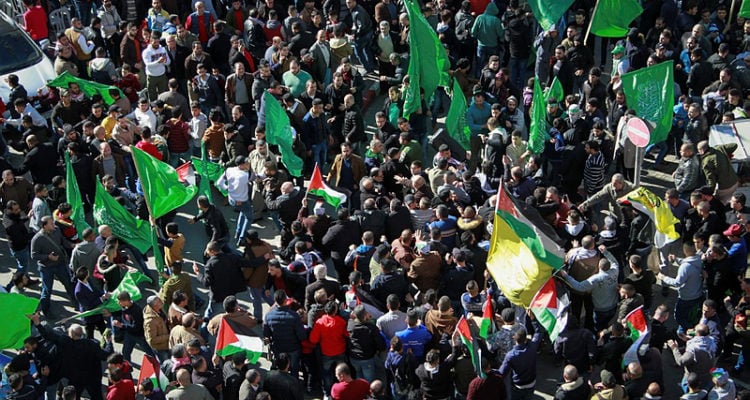21% of Israeli Arabs also think that the mass murder of Oct. 7 helps solve the Palestinian problem.
By JNS
Thirty-two percent of Israeli Arabs do not believe that Hamas terrorists intentionally targeted women and children during the Oct. 7 massacre, according to a newly published survey from Tel Aviv University.
Forty-four percent of Israeli Arabs do not feel that Israel’s response to the Hamas attack was justified while 38% believe that both Israel and Hamas share responsibility for the outbreak of war, the Moshe Dayan Center for Middle Eastern and African Studies polling conducted after the start of the war also found.
A total of 502 Israeli Arab citizens over 18 were surveyed. The Konrad Adenauer Program for Jewish-Arab Cooperation initiated the study.
According to the data, 21% of Israeli Arabs think that the mass murder of Oct. 7 contributed to a solution to the Palestinian problem.
Thousands of Hamas terrorists invaded the northwestern Negev from the Gaza Strip on Oct. 7, killing some 1,200 persons and wounding thousands more. At least 240 Israelis and foreign nationals were taken back to Gaza as hostages.
A large majority of the Arab population (85%) approve of the initiatives by Arab citizens to help the residents of the communities surrounding the Gaza Strip. About half (54%) also approve of Arab Israelis participating in global advocacy efforts on behalf of Israel.
Israeli citizenship (33%) slightly edges Arab identity (32%) as the two most dominant components of Arab personal identity, with 8% saying Palestinian identity is the dominant component.
“The war between Israel and Hamas, which began almost two months ago, has generated an unprecedented change in the positions of Israel’s Arab citizens. First and foremost, many identify with the communities of Otef Aza [the ‘Gaza envelope’] and with Israel’s efforts to present its positions to the world,” said Dr. Arik Rudnitzky, head of the Konrad Adenauer Program for Jewish-Arab Cooperation.
“Identification with Israel is manifested in the fact that for the first time, and in contrast to all previous surveys, civic Israeli identity plays as strong a role as national Arab identity for Arab Israelis,” he added.
Last month, Ra’am (United Arab List) Party MK Iman Khatib-Yasin was one of two Israeli Arab lawmakers sanctioned by the Knesset Ethics Committee for inflammatory remarks about the war.
During an interview with the Knesset Channel, Khatib-Yassin argued that Hamas “didn’t slaughter babies, at least from what we saw in the footage, and they didn’t rape women.”
She spoke days after members of Israel’s parliament were invited to view a compilation of video footage showing some of the atrocities that Hamas committed. The film, which was shown behind closed doors, included footage captured by body cameras worn by Hamas terrorists, security cameras, dashcams, smartphones, and social media accounts.
Khatib-Yassin apologized for the remarks after being pressured by Ra’am Party leader Mansour Abbas to resign from the Knesset.
Ra’am is an Islamist party affiliated with the Southern Branch of the Islamic Movement in Israel.
After Khatib-Yassin’s remarks, Israeli Justice Minister Yariv Levin vowed to criminalize the denial of Hamas’s Oct. 7 atrocities.





